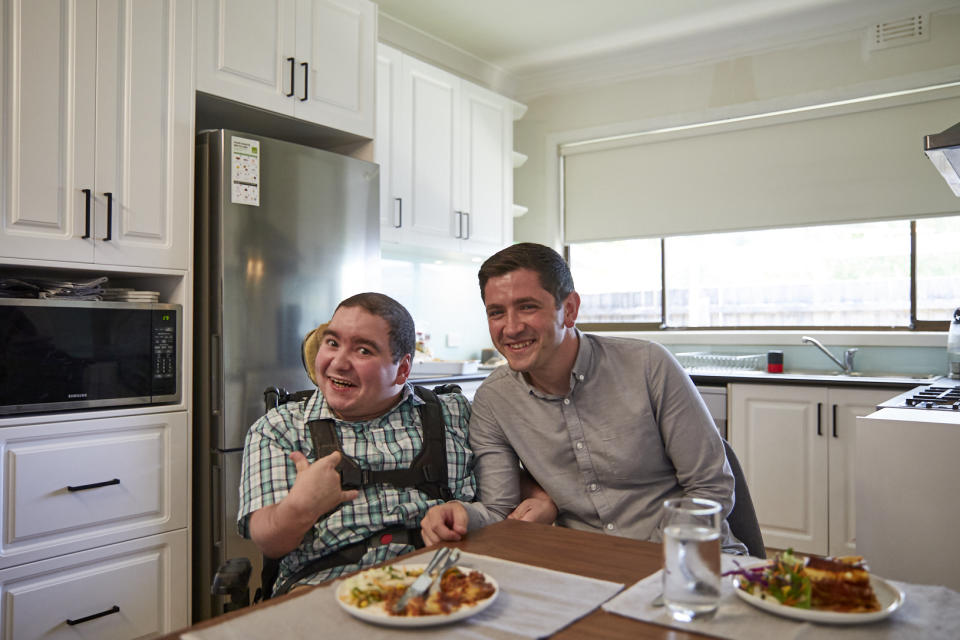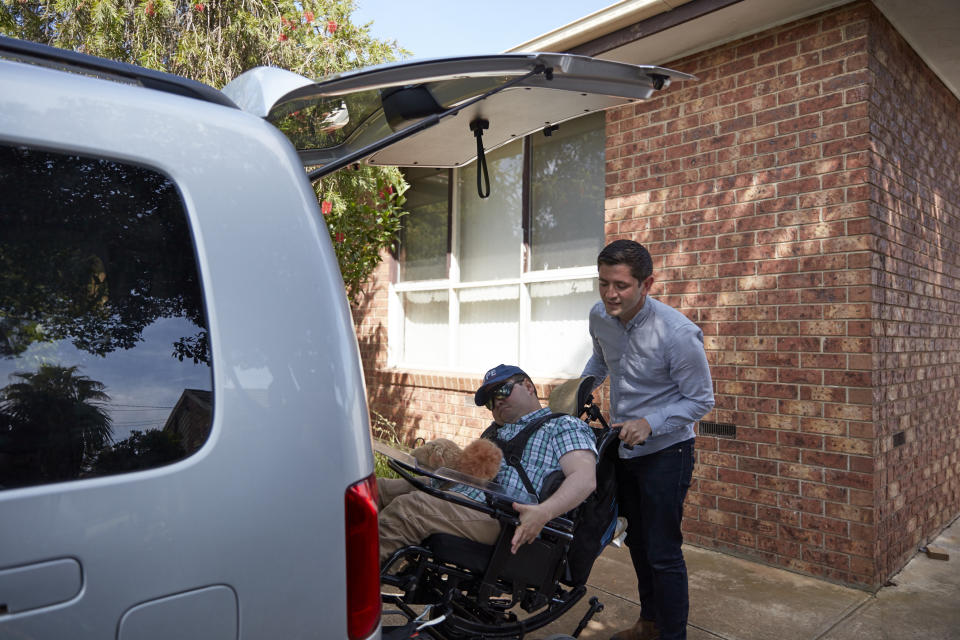What it's like being an unpaid carer during a global pandemic
Michael Casha has been a part-time carer for his older brother David, in one way or another, for as long as he can remember.
The 28-year-old says he is “incredibly proud” to have the title of ‘carer’ for someone who is his “best friend”, but admits the pandemic brought with it some new challenges that made it clear how crucial his role is in his brother’s life.

David, 30, was diagnosed with cerebral palsy when he was only five and has required a wheelchair ever since. He needs daily assistance with the majority of tasks, including getting in and out of bed, eating, drinking, showering, and travelling.
“David is my best friend,” Michael tells Yahoo Lifestyle. “He's literally the star of every party he goes to – he laughs, smiles and generally loves people and brings joy to everyone else's lives.”
Michael’s role as an unpaid carer has significantly evolved since he became an adult. When he was young, he couldn’t always physically help out, but as he got older, he started to take on a lot more responsibility to help out his parents who look after David full time.

He says the impact of these responsibilities on young, unpaid carers isn’t always understood.
“I think I was impacted in the sense that I had to grow up a lot quicker,” he explains.
“A lot of carers tend to be more mature than people at their age because of the responsibilities that fall on them.
“They are forced to face difficult things that others wouldn’t have to.”
Things have become particularly tricky since the COVID-19 outbreak around the world. With a series of heavy restrictions in place, Michael and the family have had to take a few additional steps to look after David’s physical and mental health.

One of the biggest setbacks has been the reduction in David’s time in day services. Because of prevention measures and restrictions they’ve had to minimise his social exposure which has taken a toll on David as well as increasing the demands on his family.
“The pandemic has certainly made it harder for me to care for David,” Michael tells us.
“I recently moved out of home, and while the Victorian restrictions have always allowed me to travel to care for my brother, the ongoing risk in our respective suburbs have limited my ability to see him as regularly as I did before COVID.
“As a result, all the caring responsibility has fallen on my parents, with whom David lives. However, I’ve been keeping in contact with David via the internet as much as possible so that he knows I’m still here for him, and I’ve gone along to medical appointments or attended appointments over video calls.”
Of course there are tens of thousands of young unpaid carers that have been impacted similarly by the pandemic. Though research released by Carers NSW in July indicated that many have remained resilient.
During the peak of the COVID-19 lockdown, Carers NSW conducted online interviews and focus groups with 28 young carers (young people aged 25 years and under who provide unpaid care and support to a family member or friend) to better understand their experiences and support needs.
Young carers reported their caring role helped them develop patience, empathy, resilience, organisation and time management skills and other skills relevant to professional fields, including advocacy.
However, maintaining social relationships and work and study responsibilities could prove challenging.
“Many young carers do not identify as carers or access support because they view the support they provide as an intrinsic part of the role in their family,” Carers NSW CEO Elena Katrakis said at the time.

Michael himself admits he didn’t really think of what he was doing as a ‘role’ until much later in life.
“Being an unpaid carer means I'm helping someone I absolutely love and I find it important to have a recognised name for what we as carers do,” he says.
“I grew up as a young unpaid carer while going to school, without even realising it until years later. That only changed when I met someone else who was in the same position as me.”
And his one piece of advice to other young carers out there - get the right support, such as Carers Victoria.
“I cannot stress enough the importance of having a support network,” he says.
“Knowing the role I have been playing was shared by over 750,000 other young people and many more adults in Victoria alone, was a much-needed source of relief – it removes the isolation that caring can bring.”
Carers Week (11-17 Oct) is a time to recognise the 2.65 million Australians who provide care and support to a family member or friend.
Click here to sign up to our daily newsletter to get all the latest news and hacks. Or if you have a story tip, email us at lifestyle.tips@verizonmedia.com.

 Yahoo Lifestyle
Yahoo Lifestyle 




